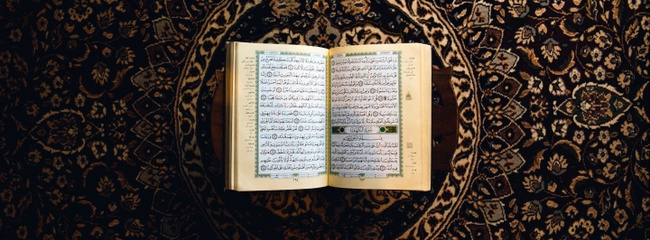"Read in the name of your Lord who created. Who created man from a clinging form. Read! Your Lord is the Most Bountiful One. Who imparted knowledge by means of the pen. Who taught man what he did not know. But man exceeds all bounds when he thinks he is self-sufficient." Quran 96:1-4
These were the first verses revealed to Prophet Muhammad ﷺ, the command to "read" followed by the use of pen emphasizes human attribution to acquire knowledge and educate others. It is our human attribute to acquire knowledge that made the angels bow in honor to Prophet Adam (alaihi salaam) when Allah ﷻ asked him to recite "names" (Al Quran 2:30-34). It is this which makes us a unique creation and responsible for our existence on earth, the use of its resources and accountability in hereafter. No other creation has been granted such responsibility. It was based on guidance from the Quran and our human potential that Muslims brought one of the greatest scientific revolutions in human history during the Islamic Golden Age. The beginning of this revolution started from 8th century Baghdad and by the 1100 CE, there were 75 madrassas (Islamic Universities) in Cairo, 51 in Damascus, and 44 in Aleppo. There were hundreds more in Muslim Spain at this time as well. It was these madrassas where students were taught religious sciences along with secular subjects the purpose of which was to integrate faith with knowledge. These educational havens in which suppressed European minds of dark ages also sought refuge from their Church. The Quran praises those who integrate faith with knowledge because such educated are truly humble and grateful for their learning: (Al Quran 35:28)…Of all His servants, only such as are endowed with [innate] knowledge stand [truly] in fear of God: [for they alone comprehend that,] verily, God is Almighty, Much-Forgiving.
With emphasis on attribute of knowledge, we are also reminded about our nature to become arrogant if learning process and progress is not guided by faith in Allah ﷻ and sense of His consciousness: (Al Quran 96:1-4) But man exceeds all bounds when he thinks he is self-sufficient - Knowledge is power and power makes one feel self sufficient but it also has the potential to corrupt. The foremost and primary purpose of education in Islam is to ensure that learning process is based on consciousness of our Creator, the primary cause of our existence and human abilities. Today mainstream education is largely divorced from such consciousness which is bound to result in ignorance and arrogance of the educated that causes them to deny accountability in the hereafter before their Creator. The Quran addresses this ungrateful attitude: (Al Quran 36:77-79) IS MAN, then, not aware that it is We who create him out of a [mere] drop of sperm - whereupon, lo! he shows himself endowed with the power to think and to argue? And [now] he [argues about Us, and] thinks of Us in terms of comparison, and is oblivious of how he himself was created! [And so] he says, "Who could give life to bones that have crumbled to dust?"
So how does God consciousness or Godlessness impact our learning process?
The best parable is given in the words of Imam Ghazali (1058-111 CE): “Education is like rain water which comes down pure. Trees, plants and leaves drink that water which assumes different natures according to their different kinds. Water increases bitterness in a plant that is bitter and sweetness in a plant which is sweet. People acquire education and change it according to their conduct and desires. One whose object of learning is to boast increases his boast by education. One whose object is to increase God-fear increases his God-fear by education.” (Ihya ulum id deen)
The Quran not only places great emphasis on education which is one of our greatest human attributes but also guides on purpose and use of education which is more important than just education. Hence revelation of the Quran not only impacted the world of education in human history but also guided on how to responsibly make use of it.
About
Zaid Shah
I carry a passion for Researching, Learning & Writing on Various Islamic Topics. To read more of my work You can also visit my personal blog website www.rizqankareem.com. You can also follow me on Instagram: https://www.instagram.com/rizqan_kareem/
- hashtag for Post: #quran #education #learning





